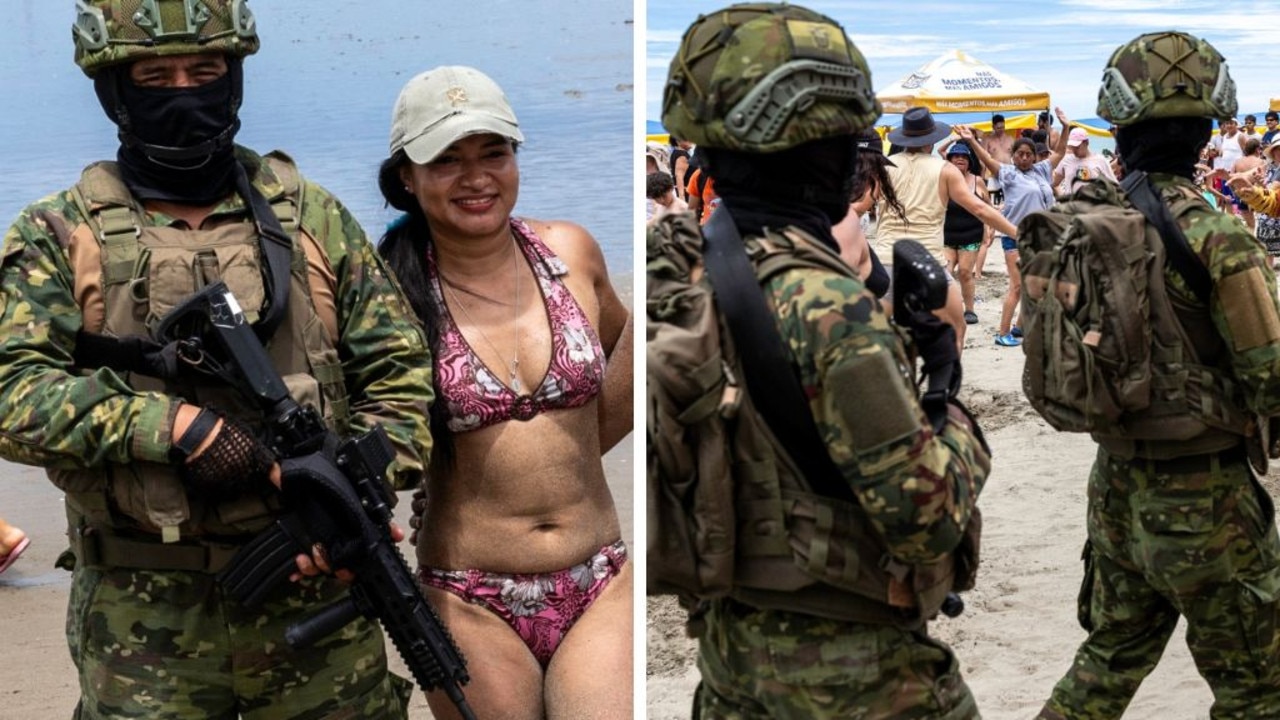[ad_1] In the South American nation Ecuador, an unsettling juxtaposition: smiling tourists and locals enjoying Carnival celebrations on the beach, a
[ad_1]
In the South American nation Ecuador, an unsettling juxtaposition: smiling tourists and locals enjoying Carnival celebrations on the beach, and surrounding them, heavily armed soldiers.
The country’s President, Daniel Noboa, recently declared a state of “internal armed conflict” to combat an epidemic of gang violence. So far more than 7000 people have been arrested as part of the crackdown, with the government labelling the gangs terrorist organisations.
While drug-related violence, extortion and death threats against residents led to the cancellation of Carnival celebrations in recent years – and convinced many Ecuadorians to emigrate abroad, particularly to the United States – this time festive events were allowed to take place in Esmeraldas Province.
Still, the signs of Ecuador’s grim situation were impossible to ignore.
In Atacames, a town of 20,000 people in the nation’s north, swimwear-clad revellers were photographed alongside soldiers over the weekend – in some cases even posing for strangely cheerful selfies with them.
In other parts of the country, the military personnel were less passive, swooping in and arresting more suspected gang members.
In one instance, law enforcement allegedly found three illegal handguns and a stolen motorcycle on a property before arresting six people, believed to be part of the gang called Los Lobos. The incident was illustrative of the past month since Mr Noboa issued his order for criminal gangs to be “neutralised”.
On Wednesday the United States announced sanctions against the gang Los Choneros and its leader, known by the alias “Fito”, whose sensational escape from prison last month preceded a horrific spate of violence. He’d previously been sentenced to 34 years in prison for crimes including murder and drug trafficking.
Fito, whose true name is Jose Adolfo Macias Villamar, was found missing from his cell, prompting the Ecuadorean government to declare a state of emergency, which still includes a nightly curfew.
That was followed by prison riots and gang attacks across the country.
Drug cartels reacted by threatening to execute civilians and security forces, and taking hostage dozens of police and prison officials, who have since been released.
They set off explosives, burned cars and, on January 9, stormed a television station and fired shots in an attack that was broadcast live.
“We stand in support of Ecuador in its fight to combat drug trafficking, curb the proliferation of prison gangs and prison violence, and take back its streets,” said Brian Nelson, America’s Treasury Undersecretary for terrorism and financial intelligence.
He added that drug trafficking gangs like Los Choneros were threatening the lives of communities in Ecuador and the region.
Once considered a bastion of peace in Latin America, Ecuador has been plunged into crisis by the rapid spread of transnational cartels that use its ports to ship drugs to the US and Europe.
On Wednesday, the US Treasury noted that the country faces “record levels of gang-driven violence”, typified by the assassination, last year, of a presidential candidate.
The Australian government currently urges potential travellers to “exercise a high degree of caution” in Ecuador due to “the threat of violent crime”.
Travellers are being warned to travel within 20 kilometres of the country’s border with Colombia, with the exception of its official border crossing at Tulcan, because of “the high risk of kidnapping and violent crime associated with drug-related criminal organisations”.
“Ecuador has declared a 60-day nationwide state of emergency, with curfews in some locations,” the government says.
“You should carry your ID at all times and follow the instructions of local authorities.
“Travel to and from airports during the curfew period is permitted for passengers travelling on scheduled flights. If you are entering via land or river borders from Peru or Colombia, you are required to present an apostilled police check covering the previous five years.”
– with AFP
[ad_2]
Source link



COMMENTS